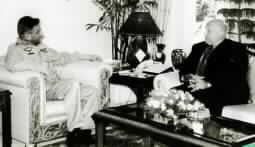HIGHLIGHTS: Bush Praises Putin's Efforts with the Two South Asian Nuclear Rivals||Pakistan Rebuffs Indian Proposal of Joint Patrols to Monitor Porous Border While New Delhi Dismisses Suggestions of Joint Anglo-American Patrols||Cross Border Shelling Kills 9 Civilians in Pakistani-ruled Kashmir|| STORY: Pakistani President Pervez Musharraf told a senior U.S. envoy on Thursday he would not start a war with India, as diplomacy appeared to be making headway in averting conflagration between the nuclear-armed foes. (Read photo caption)
U.S. Deputy Secretary of State Richard Armitage, who visits the Indian capital on Friday, told reporters after talks in Islamabad that Musharraf's comments were "a very good basis on which to proceed."
President Bush and Russian President Vladimir Putin talked by telephone on Thursday and discussed the tensions between India and Pakistan, the White House said.
Bush praised Putin's efforts to keep the two powers from going to war over the disputed Himalayan territory of Kashmir, White House spokesman Ari Fleischer said.
Putin held separate meetings with Musharraf and Indian Prime Minister Atal Behari Vajpayee at a regional conference this week in Almaty, Kazakhstan.
Bush and Putin agreed "to continue mutual efforts to de-escalate tensions," Fleischer said in a written statement.
ANGLO-AMERICAN MONITORS
India dismissed suggestions of a joint Anglo-American military monitoring force for Kashmir.
"It is absolutely unnecessary to have third-party monitoring," Foreign Ministry spokeswoman Nirupama Rao told Reuters.
She said an Indian proposal for joint patrolling by India and Pakistan -- one rejected by Islamabad as unworkable -- "was a very serious initiative."
But British Defense Secretary Geoff Hoon said an Anglo-American military monitoring force was being considered.
Armitage told reporters his talks with Musharraf also touched on how to monitor incursions by Muslim fighters that have stoked a 12-year uprising against Indian-rule in the disputed Province of Kashmir.
"We're discussing all sorts of monitoring mechanisms, without any prejudices one way or another," Armitage said.
ARTILLERY DUELS ON BORDER
Indian and Pakistani troops again traded heavy artillery and machinegun fire on Thursday across their Kashmiri frontier, as frontline villages in Pakistan practiced civil defense drills and thousands of foreign residents left the two countries.
Pakistani officials said six Pakistanis were killed and several injured. The dead included two girls killed in Rawalakot district in the south of Pakistan-controlled Kashmir and a woman in nearby Kotli district.
Indian mortar fire also killed three boys at a village near Nakial town in Kotli district, the officials said.
But India said the intensity of firing along the Line of Control and the international border in disputed Kashmir had fallen significantly since Wednesday.
India also reported that its security forces shot dead the chief of a pro-Pakistan nationalist group in Kashmir.
Rafiq Lone, head of the Harkat-ul-Jehadi Islami rebel group, fighting for Indian Kashmir's merger with Pakistan, was killed in an overnight gun battle, police said in a statement.
LAST-DITCH EFFORT
Armitage is trying to set the stage for talks between two old foes that have refused so far to meet each other halfway.
Defense Secretary Donald Rumsfeld is scheduled to follow Armitage to Pakistan and India next week. Bush phoned Musharraf and Vajpayee on Wednesday asking them to take steps to reduce the risk of war.
India's junior foreign minister, Omar Abdullah, told CNN on Thursday that India was seeking to work with Pakistan and world powers to avert a war.
Although both countries have downplayed the possibility that a new war could turn nuclear, India has an estimated 100 to 150 nuclear warheads and Pakistan 25 to 50.
In Spain, a senior Pakistani envoy conceded there was a risk that a war could go nuclear but said Islamabad considered such an option "unthinkable."
"The option is there, but it's quite unthinkable and Pakistan has never factored this capability in as an option to rely on. Pakistan relies on its conventional force capability," retired General Jehangir Karamat, touring European capitals to put across Pakistan's position, told Reuters Television.
PHOTO CAPTION
Pakistan President General Parvez Musharraf (L) meets with United States Deputy Secretary of State Richard Armitage in Islamabad, June 6, 2002. Armitage said the Pakistani president had told him Pakistan would not initiate a war with nuclear rival India and that Washington expected similar assurance from New Delhi. (Press Information Department via Reuters)
- Section:
WORLD HEADLINES


 Home
Home Discover Islam
Discover Islam Quran Recitations
Quran Recitations Lectures
Lectures
 Fatwa
Fatwa Articles
Articles Fiqh
Fiqh E-Books
E-Books Boys & Girls
Boys & Girls  Ramadan
Ramadan Fatwa Audios
Fatwa Audios Month of Mercy
Month of Mercy Women
Women Eed Al- Fitr
Eed Al- Fitr Food Recipes
Food Recipes Videos
Videos

 Prayer Times
Prayer Times












